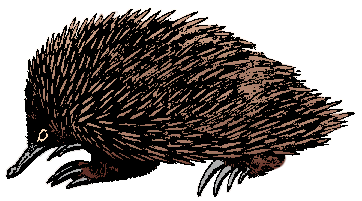echidna
nounDefinition of echidna
: a spiny-coated toothless burrowing nocturnal monotreme mammal (Tachyglossus aculeatus) of Australia, Tasmania, and New Guinea that has a long extensible tongue and long heavy claws and that feeds chiefly on ants
also
: a related mammal (Zaglossus bruijni) of New Guinea having a longer snout and shorter spines
Keep scrolling for more
Keep scrolling for more



